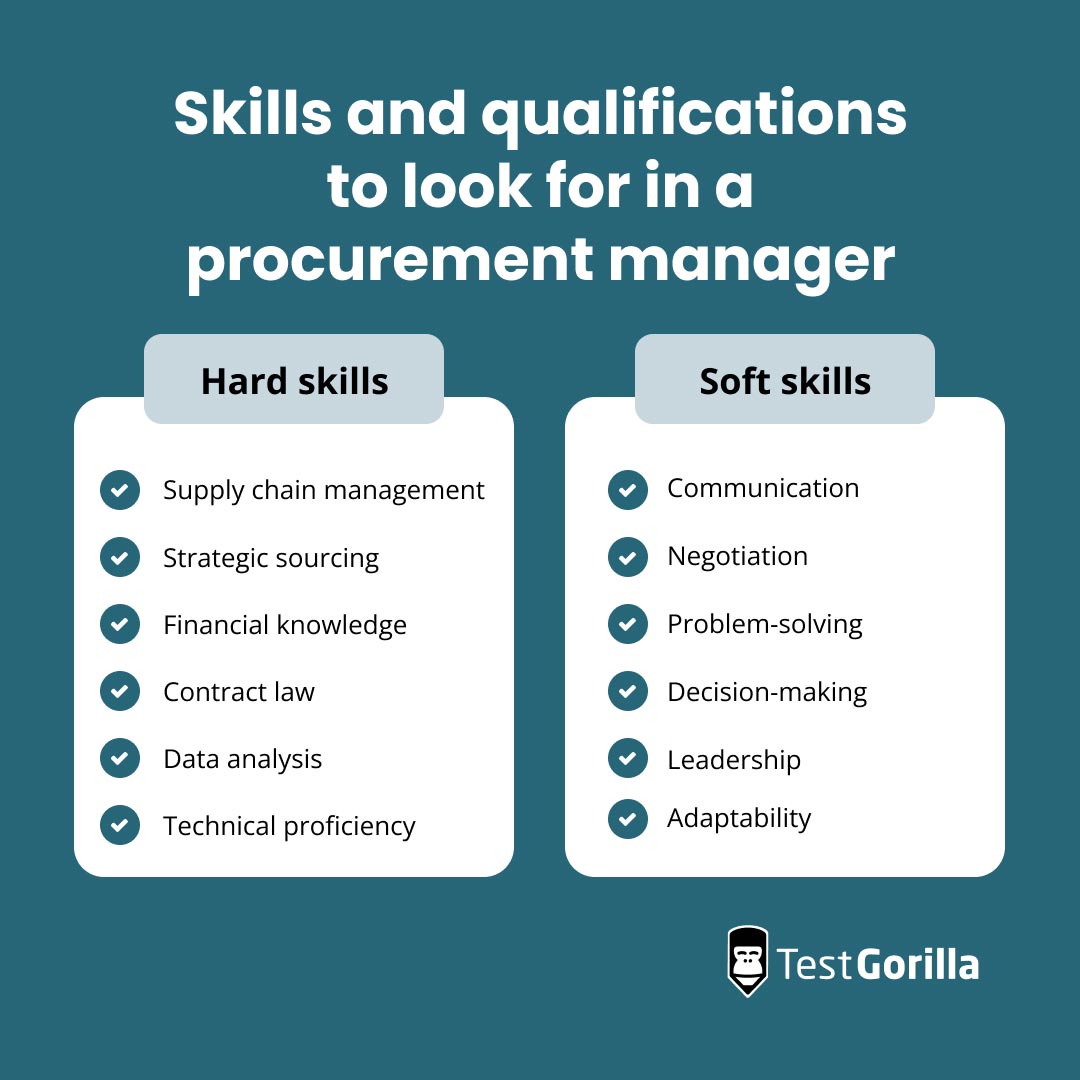When hiring a supply chain specialist – specifically a procurement manager – you want to ensure the candidate you’re selecting is up to the task.
Does your candidate know how to source the supplies companies in your industry need when they need it? Can they engage with your team and suppliers using soft skills that strengthen your business relationship? If not, you run the risk of hiring someone who could cause friction within your team and cost your company thousands in contracts and revenue.
To avoid this, you must know which skills make a great procurement manager and how to identify and assess them. Additionally, you should know what an attractive compensation package looks like for this role and common mistakes to avoid when hiring.
Our guide covers all these and more.
Table of contents
- What you need to know before hiring a procurement manager
- Skills and qualifications to look for in a procurement manager
- Where to find skilled procurement managers
- How to select the best procurement manager candidates
- 4 common mistakes when hiring a procurement manager
- Satisfy your procurement needs with a strong candidate
What you need to know before hiring a procurement manager
Before hiring a procurement manager, you should ask yourself a few questions. Your answers will help you seek out a procurement manager who can contribute to your company’s success.
What are your organizational needs and procurement scope?
Before hiring a procurement manager, pinpoint your organization's specific procurement needs. Consider the scale of purchasing, types of goods or services needed, and the complexity of supply chains involved. For instance, a company requiring regular, high-volume purchases of raw materials will need a manager with experience negotiating large contracts and managing extensive supplier networks.
When does your company need a procurement manager?
Once you’ve pinpointed exactly what your company needs, you also need to know when the right time to hire is. You’ll need to hire a procurement manager if:
Your company’s growth is making your procurement process more complex
Your procurement volume has become too high for your current staff
You need specialized procurement skills
You need someone to manage your supplier relationships strategically
What industry-specific knowledge should your procurement manager possess?
Your procurement manager should have a thorough understanding of your industry – including its standards, regulatory compliance, and market trends. In industries like healthcare or aerospace, where a lack of regulatory compliance can result in hefty penalties, industry-specific knowledge becomes even more important.
Which technology software and tools should they be familiar with?
Today's procurement processes often involve sophisticated software and tools for supply chain management, e-procurement, and data analysis. Your candidate must be proficient in modern procurement technologies and willing to adapt to new tools.
What’s an attractive benefit and compensation package?
Think about what will attract the strongest candidates. This includes salary and benefits like flexible working conditions or opportunities for professional growth. To set a competitive offer, look at what similar businesses in your industry and region are offering.
You can find information on compensation packages for procurement managers in your industry by referring to the Chartered Institute of Procurement & Supply (CIPS) salary guide, which offers detailed information on industry standards.
Skills and qualifications to look for in a procurement manager
When looking for a procurement manager, these hard and soft skills will help you identify qualified candidates.
Hard skills
A procurement manager’s hard skills include the following:
Supply chain management: The candidate should understand how supply chains work and be skilled in managing the logistics of getting goods from suppliers to your business.
Strategic sourcing: Look for someone who knows how to find the best suppliers and negotiate contracts to secure quality materials or services at the best prices.
Financial knowledge: A good procurement manager should be comfortable with numbers, able to manage budgets, and effective at analyzing costs.
Contract law: They should have a solid understanding of commercial law, especially around contracts, so they can manage and mitigate risks in agreements.
Data analysis: In today’s data-driven world, a procurement manager’s ability to analyze purchasing data to make informed decisions is critical.
Technical proficiency: Familiarity with procurement software and tools is essential for efficiency and staying current with purchasing trends.
Soft skills
These are the soft skills procurement managers need:
Communication: They must be able to communicate clearly and persuasively with suppliers and team members.
Negotiation: Procurement managers must be strong negotiators who can broker deals that benefit your company.
Problem-solving: Their ability to think on their feet and solve unexpected issues is key.
Decision-making: A procurement manager should make sound decisions that align with your company’s strategy and goals.
Leadership: They should inspire their team, manage projects effectively, and drive continuous improvement in procurement processes.
Adaptability: The best candidates can adapt to new challenges, market changes, and shifts within the industry.
Qualifications
Qualifications to look for might include a bachelor’s degree in business, supply chain management, or a related field. Professional certifications such as the Certified Purchasing Manager (CPM) or Certified Supply Chain Professional (CSCP) are a plus.
The best insights on HR and recruitment, delivered to your inbox.
Biweekly updates. No spam. Unsubscribe any time.
Where to find skilled procurement managers
When sourcing candidates for this role, ensure your procurement manager job description is specific to your organization’s needs. This can help narrow your search down to your target candidates. Once you have a job description in hand, here are some standard ways to source procurement manager candidates:
Supply chain job boards: Websites like ProcurementJobs specialize in postings for supply chain and procurement roles, attracting candidates who are specifically looking for these types of positions.
Professional associations: ISM and CIPS offer directories of certified professionals on their websites, as well as job postings – where they’re visible to highly skilled procurement professionals.
Procurement manager recruitment agencies: Agencies like Michael Page or Robert Walters specialize in procurement and can help you find candidates who’ve been pre-vetted and match your specific requirements.
6 creative ways to find procurement manager candidates
When standard methods of sourcing candidates don’t work, consider these creative solutions:
Social media targeting: Use platforms like Twitter or Instagram with targeted hashtags like #procurementjobs or #supplychainmanagement to catch the attention of passive job seekers.
Webinars and online workshops: Host or sponsor webinars and workshops on procurement topics to attract professionals interested in developing their skills and learning about new opportunities.
Alumni networks: Connect with universities offering degrees in supply chain management or business and tap into their alumni networks, where you can find recent graduates or experienced professionals looking to advance their careers.
Industry forums and online communities: Participate in online communities like Procurious or the Supply Chain Management sub-reddit, where professionals discuss industry trends and career opportunities.
Case competitions: Organize or sponsor procurement-related competitions that challenge participants to solve real industry problems, allowing you to spot talent in action.
Partnerships with trade schools: Partner with trade schools that specialize in logistics and supply chain management to access a pool of job-ready, trained professionals.
How to select the best procurement manager candidates
Selecting the best procurement manager candidates involves a strategic multi-tiered approach that combines procurement management pre-employment assessments with targeted interview questions.
Use skills assessment tests
To ensure your candidate has the skills needed to succeed as your procurement manager, consider using TestGorilla’s procurement management skills assessments.
Supply Chain Fundamentals test: This test assesses if your candidate really knows how supply chains work. It's good for finding applicants with experience in supply chain jobs who can handle different verticals within your business.
Negotiation Skills test: This measures how well someone can negotiate and make deals that are good for your business. It's designed to help you select candidates who are great at negotiating and can help your company succeed.
Business Ethics & Compliance test: This assessment ensures candidates understand and can uphold ethical practices in business dealings. Ethics are crucial for maintaining a company's integrity and adherence to legal and regulatory standards.
Purchase Executive (Overseas Procurement) test: This purchase executive test evaluates a candidate’s ability to procure internationally sourced materials and services. This screening test will help you hire purchase executives who can execute and complete the full procure-to-pay (P2P) cycle.
Purchase Executive (Local Procurement) test: This Purchase Executive test evaluates a candidate’s ability to procure locally sourced materials and services. This screening test will help you hire purchase executives who can execute and complete the full procure-to-pay (P2P) cycle.
Conduct interviews
Be deliberate when interviewing procurement management candidates by using targeted questions. Ask about past experiences with supplier negotiations, cost-saving initiatives, or cross-functional team leadership to understand their approach and results.
Pose hypothetical scenarios related to procurement challenges and listen to their problem-solving strategies. To ensure they’ll contribute positively to your company culture, see if their values align with your company's by asking about their work style, collaboration, and ethics.
Test candidates with practical exercises
Consider giving candidates a real-life case study related to procurement to solve. Alternatively, ask them to analyze one of your company’s past procurement decisions and suggest improvements.
Consider their experience in the industry
After you’ve narrowed down your applicant pool with skills testing, keep an eye out for candidates with a history of successful procurement projects and roles, particularly those who’ve worked in your industry. This will shorten the learning curve of a new hire so they can hit the ground running once they’ve been onboarded.
4 common mistakes when hiring a procurement manager
Avoid these four common hiring pitfalls, and you’ll be well on your way to hiring a strong procurement manager.
1. Disregarding strategic sourcing skills
Not evaluating a candidate's experience with strategic sourcing methodologies can result in hiring a procurement manager who’s unable to develop and implement cost-saving procurement strategies. You might end up paying more for materials and could run into trouble getting what you need when you need it.
2. Underestimating the importance of supplier relations
Overlooking the candidate's ability to foster and manage supplier relationships can lead to a procurement manager who can’t maintain a reliable and ethical supply base. A procurement manager who can't get along with suppliers might get lower-quality goods, and it could be harder for your company to get good deals in the future.
3. Not assessing negotiation tactics
Failing to assess a candidate's negotiation tactics and experience with complex contract terms can result in hiring a procurement manager who may not secure the best terms. Your company could end up with costly contracts that benefit the supplier more than you.
4. Ignoring adaptability to procurement technologies
Not considering a candidate's proficiency with the latest procurement technologies – such as e-procurement systems or advanced analytics – can lead to hiring a procurement manager who may miss out on ways to save money or increase your company’s efficiency.
Satisfy your procurement needs with a strong candidate
Your procurement manager is responsible for getting you the tools and supplies your company needs when you need them. They should understand supply chain management, have strong negotiation skills, and possess strong knowledge of your industry.
To attract and hire great candidates, you’ll want to know exactly who you’re looking for, use creative methods to find suitable applicants, and assess their skills using pre-employment testing. TestGorilla’s test library has hundreds of assessments that make this selection process easier.
Want to learn more? Sign up for our free plan or take our quick product tour to begin your candidate search today.
You've scrolled this far
Why not try TestGorilla for free, and see what happens when you put skills first.















